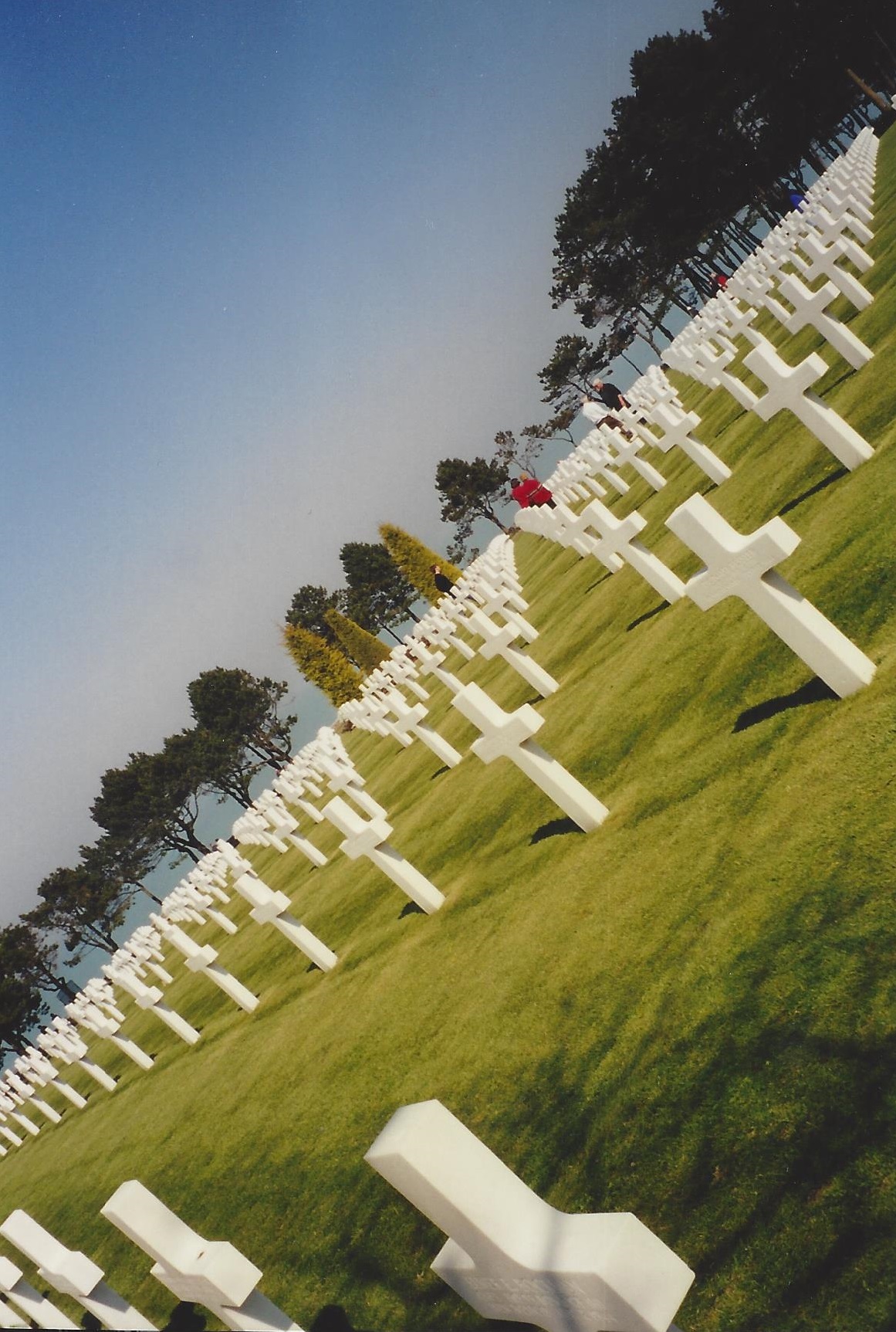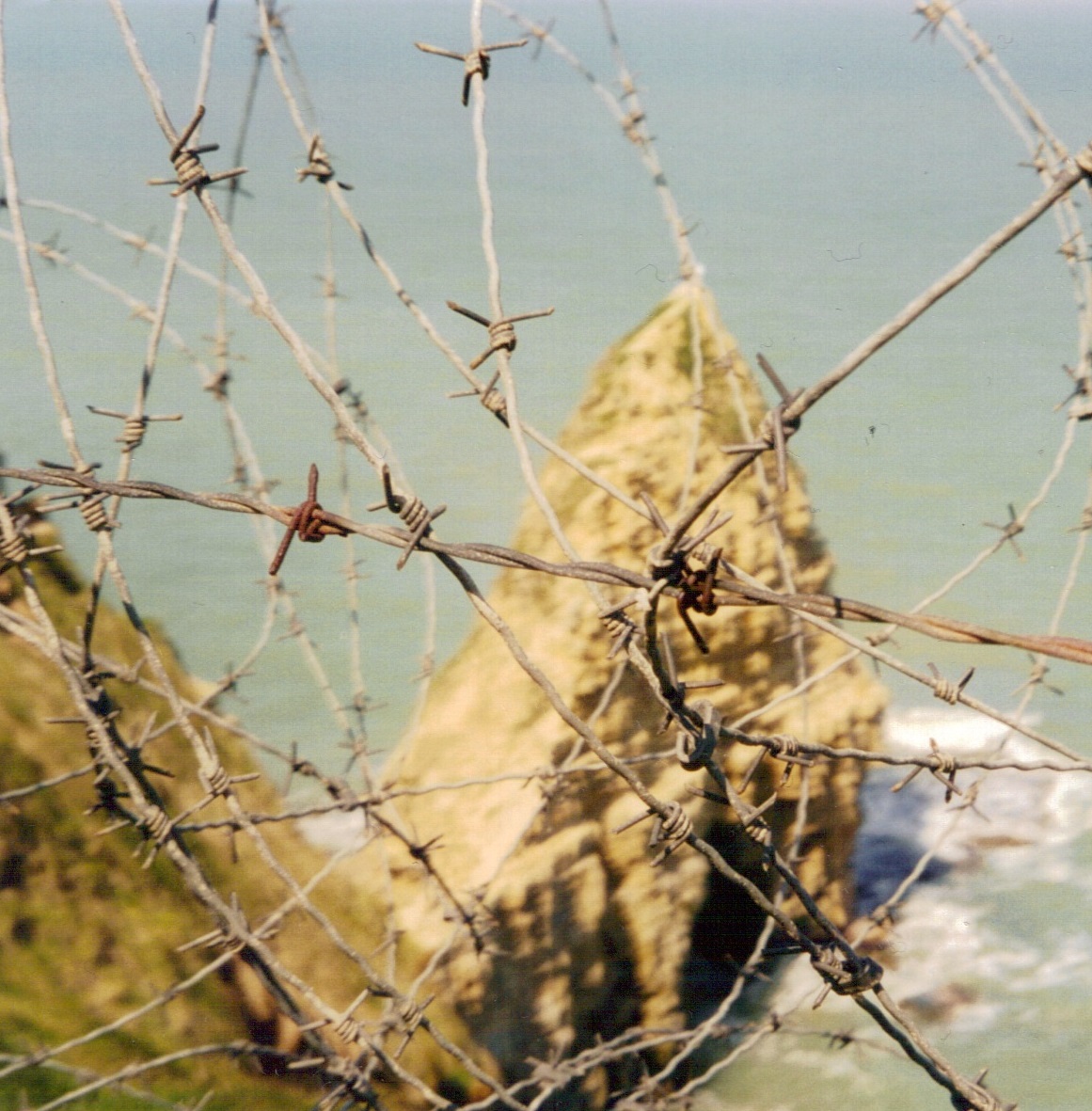A Tribute to the Heroes of D-Day and Their Profound Effect on My Life
I stood behind the entanglement of rusted barbed wire as my hair whipped furiously in the strong wind. It was a chilly but sunny day in March 2000. I was at the top of the Pointe du Hoc, the cliff in Normandy, France that made history on D-Day during World War II.
I had always wanted to visit the Normandy beaches on so many of my past trips to France. As a history lover and a proud patriot, I needed to see for myself this hallowed ground where the Allies helped turn the tide of the war. I looked down on this cheery day, amazed at the sheer steepness of the cliff I was on, 100 feet straight down.
On June 6, 1944, the Pointe du Hoc was a German stronghold that was fortified with blockhouses and gun pits which spewed bullets and hellfire, picking off soldier upon soldier as the American troops tried desperately to make their way onto the beachhead that morning. Taking out this battery would prove to be significant to the outcome of the battle that day, and in turn, the entire war.
This was a cliff I wouldn’t want to be forced to scale even on this peaceful day where calmness prevailed and the only sounds I could hear were those of hungry seagulls and the howling sea winds. So, to imagine what it was like to climb on June 6 was almost incomprehensible to me. But, I closed my eyes and envisioned courageous men using all of the limited tools they had with them to scale the jagged rocks as they were continuously pummeled by machine guns and grenades. Their physical and mental faculties were put even further to the test under the sheer chaos and the cacophony of war: the clattering noise of machineguns, exploding mines and missiles, and the helpless screams of the wounded.
I opened my eyes and focused below on one triangular rock formation. I didn’t have a clear view of it because of the barbed wire between the blockhouse and the edge of the cliff. It was then when I had an epiphany in which I realized what real challenges and sacrifice is about. I thought about how once the US Army 2nd Ranger Battalion did the impossible by bravely and doggedly scaling the cliff and reaching the top, they couldn’t even rest. Now they were faced with yet another formidable task: breaking through the entangled barbed wire, past the gunfire and enemy defense lines, in order to clear the gun pits and blockhouses so that the rest of the allied troops could safely set foot on the beach.
At this moment, I felt rather insignificant. What I thought were challenges in my life were really just personal and work trials and tribulations, stupid things like getting angry over slow morning commute, a difficult co-worker or a friend cancelling weekend plans at the last minute. Compared to what these men – and all of the brave men fighting that day – had faced, I felt ashamed of the things that I typically complained about. How trivial these things seemed to me as I gazed out at the English Channel, picturing the largest armada in history.
I told myself that in the future, whenever anything got tough for me – under any circumstance and however often – that I would draw strength knowing that greater and more significant challenges were met here on June 6, 1944 – 70 years ago. If those WWII veterans faced their fears here on this ground, there wasn’t anything I too couldn’t contend with in my own life.
Unfortunately, I had to put that mantra to the test in 2007 when, at the age of 40, I was diagnosed with Hodgkin’s lymphoma. Though weary from the fear of the unknown and dying as well as the unbelievable pain of bone marrow biopsies, a blood clot and 6 months of chemo and radiation, I was determined to fight my own battle as best I could.
Every cancer patient has something inspiring that helps them focus on getting through it – something that makes them strong. For me, it was remembering and honoring all of the brave men of D-Day: young men in the prime of their youth facing the unimaginable. I thought of the fear and anxiety they must have felt every single minute, never knowing when they awakened if that day would be their last.
For some it was. For others, they trudged on reluctantly and saw the end of the war. They came home and got married, started families and new jobs. They contributed to society and made something of their lives. Moreover, they did it without complaining or carrying a chip on their shoulders for their lost youth, pain and suffering. It was their duty, they believed which further demonstrated their great character and subsequently earned them the fitting moniker of “The Greatest Generation.”
Each year we lose more and more of our World War II veterans and it makes me very, very sad. In fact, most of you who know me aren’t at all surprised when I run up to any older gentleman I see with a WWII Veteran hat or jacket.
I did this just a few weeks ago when I was having dinner with friends. During our meal, I had caught a glimpse of a man at another table wearing a ‘WWII Veteran’ hat. He was old and frail now, a shadow of himself during his prime, during the war. As we ate, I monitored his activity and watched as he got up to leave, grabbing his cane. I politely excused myself and went to him as he slowly moved passed our table.
“Hello Sir,” I said, touching him on the sleeve. He stopped and stared at me, and he seemed confused. I continued, “I see that you are a WWII veteran and I just want to thank you for your service. Thank you so very much.”
He didn’t smile as he looked me squarely in the eye, but simply responded, “You’re Welcome.” The greatest generation indeed.
So on this commemorative anniversary of D-Day, please remember those brave men and all of our servicemen and women who have protected and served our country through the years, and especially those who have given the ultimate sacrifice.
God Bless America.

